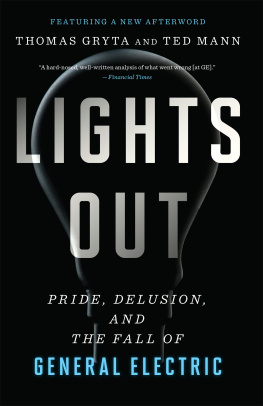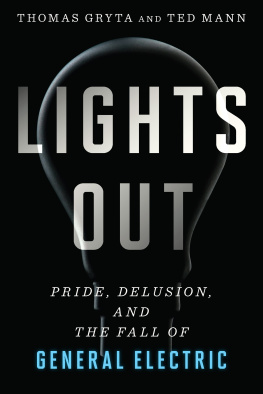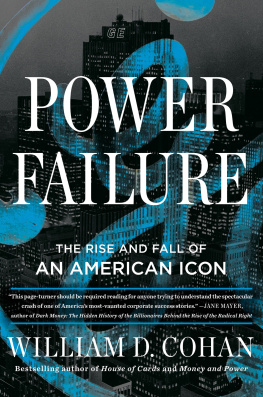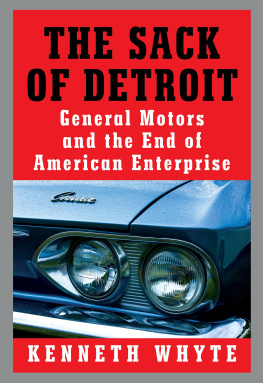First Mariner Books edition 2021
Copyright 2020 by Thomas Gryta and Ted Mann
All rights reserved. No part of this book may be used or reproduced in any manner whatsoever without written permission except in the case of brief quotations embodied in critical articles and reviews. For information, address HarperCollins Publishers, 195 Broadway, New York, NY 10007.
marinerbooks.com
Library of Congress Cataloging-in-Publication Data is available.
ISBN 978-0-358-25041-8 (hardcover)
ISBN 978-0-358-56705-9 (pbk.)
eISBN 978-0-358-24357-1
v5.0921
Cover design by Brian Moore
Author photographs Bryan Murray (Gryta); Tom Williams (Mann)
To our wives, Virginia Gryta and Annie Karni
1
Off a Cliff
Schenectady, New York, 2017
J OHN FLANNERY PULLED into the little city on the Mohawk River in late July with numbers on his mind, passing beneath what had once been the largest electrified sign in the world. The storied logo had been surpassed by taller structures long ago, but it still glowed from atop the mammoth brick shoebox of Building 37 as Flannery passed through the gates and into the birthplace and spiritual home of the General Electric Company.
Schenectadythe electric cityhad been home to the Edison Machine Works. It was there that GE was incorporated in 1892, assembled by bankers out of the nonperforming attempts of inventors to translate their brightest ideas into business.
What had blossomed in Schenectady was the stuff of cultural legendinventions, manufacture, mass production, unstoppable growthbut there was a sense of cavity now to the giant old industrial grounds. More than forty thousand men and women had worked there at GEs peak. It was a tenth of that size by 2017.
History, however, wasnt Flannerys mission. His focus was inside. Schenectady now was the headquarters of GE Power, the largest and oldest division of what had long been Americas most famous conglomerate.
And John Flannery, just weeks away from taking over leadership of the most famous C-suite in American business, had come to see GE Power leaders on their home turf and to take stock of the heart of the company he was about to lead.
Flannery was like a president-elect, the incoming chief executive officer of one of the most famous and well-respected companies on earth. Just ten other men had held the job he was preparing to take on. With the formal and official announcement made, Flannery was organizing his team and girding himself to take on the hardest challenge of his professional life.
To an outside eye, nothing more than another orderly and carefully planned corporate succession was under way, one as smooth as those GE had prided itself on in the past. Flannerys predecessor, Jeff Immelt, was overseeing a peaceful transfer of power before making way for a new manager to rise up from GEs ranks and carry on the companys traditions for another decade or so.
But appearances were deceiving. What was actually unfolding behind the scenes at GE was dysfunction tending toward chaos and a confrontation with the past that was mere weeks from spilling into public view. Beneath the placid surface, GE was in total disarray.
Flannery had barely had a moment to reflect after the companys board tapped him to be the new CEO. That whirlwind weekend opened into a week of press conferences, media interviews, internal town hallstyle meetings, and multiple executive briefingsall compulsory steps in the process of preparing Flannery to take the reins of one of the worlds biggest and most closely watched companies.
And prepare he would. Flannery was a voracious reader, his wide-ranging tastes reflected in his conversations, but he didnt ooze arrogance as some corporate chieftains do. He was a man constantly reexamining himself, his curiosity often reflecting inward as he reviewed his past calculations and decisions like an analyst poring over a slide of film.
That same bankers instinct to endlessly search for new angles and to weigh his options, to crunch and recrunch every number, flowed from the same quietly adventurous source that led him to venture down dirt roads with his wife in exotic locales. He was a hunterfor killer deals and hidden risks, for undiscovered roadside taverns serving lunch.
Flannery stood a little under six feet tall. He was slightly stout and usually wore dark suits that reflected his finance roots. He wasnt shy, but he wasnt one to work a room either, in contrast to some of those he had outmaneuvered to win the new job. Some GE executives glad-handed as aggressively as candidates for Congress. Flannery was self-deprecating, though possessed of a disarming confidence. At company events for investors and the press, a wry smile often played at the corners of his mouth, a contrast with the brand of GE earnestness exuded by his colleagues.
He would have to adjust to his new stature, however, as he took on a kinglike role in a company that took itself just as seriously as a kingdom. But he hadnt yet. Like a world leader, Flannery would need to get used to being whisked from one place to another, having a full security detail, and constantly having a car, plane, or helicopter waiting to deliver him to the next stop. In the hours before his predecessor, Immelt, arrived for one of his innumerable visits to GE facilities all over the world, telltale trappings would begin to appear at his destination: hard candies and a plentiful supply of his favorite diet soda appeared on shelves in conference rooms, always there before anyone in Immelts entourage even had to ask. Rumor among stock analysts held that he flew with his own treadmill, lest the hotel gym prove insufficient. No one knew yet what soda John Flannery liked. And Flannery certainly wasnt used to any of this.
When he walked to the elevator bank in GEs Boston office, an assistant immediately scrambled over to hit the Down button, apologizing that the elevator hadnt been waiting for him. Flannery appreciated the effort, but the royal treatment seemed a bit overboard and he told people so.
Working closely with Immelt, he had seen these trappings before, but now, Flannery told people, he found them slightly suffocating, and occasionally a little silly. Nevertheless, this was the job. With its vastness came complexity, the crammed agenda, the aides and meetings, the planes and guards. Although he wasnt going to be able to ditch the entourage anytime soon, at least he had a good excuse to get away from headquarters on trips like this one to Schenectady. No one challenged his need to get acquainted with the details of the business.
A road trip was also good for clearing the head. John Flannery had been announced as the new CEO on June 12. His father, John, a retired banker in West Hartford, Connecticut, had died just twelve days later. It was some comfort to the younger Flannery that he had been able to share the news of his promotion, and that his father had lived to see his son tapped to land one of the most prominent jobs in American business. Still, his dads passing hurt. Loss shaded his satisfaction and pride.
Flannery had outperformed three rival GE executives to win the contest to succeed Immelt. The latter had served sixteen years as CEO, but had shown very little outward sign that he was ready to retire, even to those aiming to succeed him, until just before his departure was announced.
Flannery was a finance whiz, a veteran of GEs large lending business, which made him a dark horse at first in the race for CEO, given the companys traditional reverence for its industrial businesses and their leaders. But the board knew that GE needed a fresh assessment. Immelts strategy was stuck in the mud, and his supremely optimistic mantras simply werent falling to the bottom line.








